Parsley root: medicinal properties and benefits for the body
The use of parsley root for medicinal purposes has been known for a long time. The traditional approach to such drugs is due to their high benefits and value for the body.
Content:
- Composition, useful and medicinal properties
- Harm and contraindications
- Application
- How to choose and store parsley root
Composition, useful and medicinal properties
The familiar parsley root is a plant from the Mediterranean region. It has a characteristic nutty flavor and has some similarities in appearance to parsnips. The ground part of the plant is widely used in cooking - the leaves are actively used as a spice and fill dishes with a special taste. But the root is less known as a food product, although today it is actively used in the diet in many European countries. Moreover, they are eaten both cooked and raw.
Simple value parsley due to the complex chemical composition of the plant. A large number of useful minerals and trace elements are hidden inside the root, among which it is worth highlighting vitamin C and group B, vitamins P and A. Also, parsley contains a sufficient amount of vitamin E, PP, K. contains potassium and manganese, potassium and calcium. There is an impressive amount of phosphorus, iron, molybdenum. It can be argued that regular consumption of parsley helps to normalize the content of vitamins and minerals in the body.
With a low calorie content, this plant becomes an important element of dietary nutrition.
The use of parsley roots has been known since ancient times, when they were still an integral part of traditions and rituals. Healers everywhere introduced this plant into their practices.
Parsley root has the following effects on the body:
- diuretic
- stimulating the natural elimination of toxins and toxins from the body
- anti-inflammatory
- antiallergenic
- restorative
- digestion improving action
Harm and contraindications
Parsley has a fairly strong effect on the body. A large number of effects created with her participation, as well as the content of many elements, impose certain contraindications and restrictions on the use of parsley root for some categories of people.
First of all, pregnant women who are in the second trimester should be attentive to the consumption of parsley.
Parsley juice is contraindicated for people suffering from cystitis and nephritis of various stages. Careful consideration should be given to the use of parsley in the treatment of various diseases in that case. If there are problems of the genitourinary system. In any case, you should monitor your body and seek qualified help at the first problems.
Application
Parsley is primarily associated with cooking. In this direction, its application is known to everyone. But besides this, the plant occupies its own niche in medicine. In folk medicine, parsley root is one of the key medicines for a wide range of diseases, from disorders of the genitourinary system to coronary heart disease.
The plant is equally beneficial for both men and women.The beneficial effect on the body in cardiac disorders is especially highlighted. Parsley, including the root, was actively harvested for the winter as an additive to carrots, parsnip, turnip and celery... It is an integral part of many salads.
Parsley is readily added to cooked and other types of hot dishes, complementing them with an unusual aroma. In cosmetology, the popularity of parsley is due to the created whitening effect, which helps to lighten the existing tan, as well as spots and freckles.
Summing up the benefits of using parsley, you should list the diseases for which it will be especially useful:
- Various diseases of the gastrointestinal tract, including flatulence, colic and hypersecretion of gastric juice.
- Digestive disorders.
- Decreased appetite.
- Disruptions in the menstrual cycle.
- Decreased tone of smooth muscles of the prostate and uterus.
- The development of prostatitis and diseases of the genitourinary system.
- Signs of impotence.
- Decreased libido in women.
- The development of edema of various formations.
- High pressure.
- Coronary insufficiency.
- Decreased bowel tone.
- Bronchitis.
- Various inflammatory processes.
- Heat.
- Kidney disease and others.
It is recommended to eat parsley in moderation on a regular basis - this way you can significantly strengthen the immune system and raise the general tone of the body. To maintain the required level of trace elements in the body, it is enough to chew a small amount of the plant before meals, or add it to food.
An interesting feature of parsley when used in cooking lies in the peculiarities of consumption - in the West, parsley has long been used as an independent side dish, while in the post-Soviet space its value is not fully recognized and the plant is used only as a spice for main dishes.
There are more than enough options for using parsley root in cooking: you can simply crumble it into ready-made dishes, you can bake, boil, stew and fry.
It is also willingly ground into various salads and side dishes. The success of parsley in cooking is associated not only with the high benefits of eating the product, but also with the excellent combination of parsley with meat, fish and fresh vegetables and even fruits. The subtle, recognizable aroma of parsley goes well with various types of cheeses, seafood and nuts.
How to choose and store parsley root
Use only properly selected parsley... The root should be of medium size, and also not have pronounced damage or traces of disease development. A beige color indicates the health of the root and its suitability for human consumption.
Pay close attention to the structure of the root - it must have a certain strength and retain its shape for a long time. In a fresh plant, the leaves have a pronounced green color.
Parsley root is best consumed fresh - as it contains the maximum amount of useful elements that contribute to the recovery of the body.
The root is difficult to store for a long time - it can remain in the refrigerator for a maximum of 2 weeks. With longer storage, the root begins to decompose and withers rapidly. If you want to keep it as long as possible, then you can dry the root and add it to dishes or in a spice or decoction format.
More information can be found in the video:



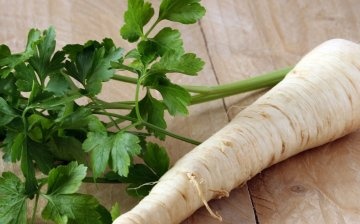
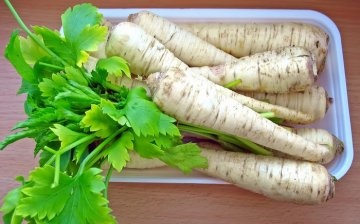
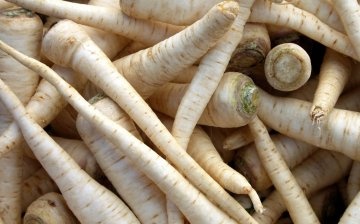
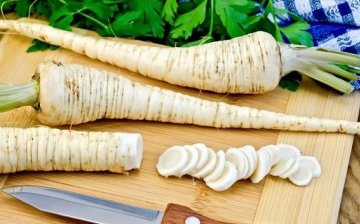






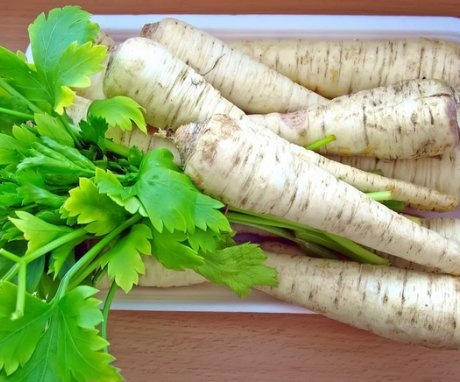
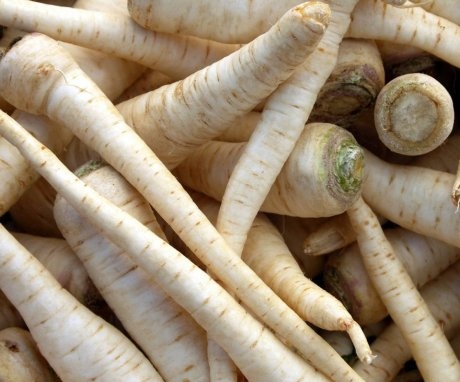
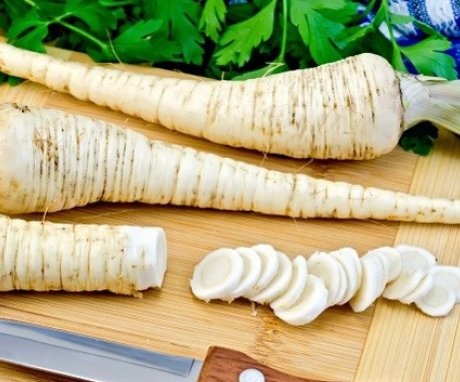

I believe that the root and leaves of parsley are very beneficial for men's health. I often use them together with celery. Most often I make salads from the leaves, and I add the roots, mainly when preparing meat dishes. It turns out very tasty.